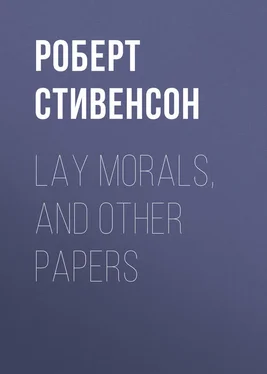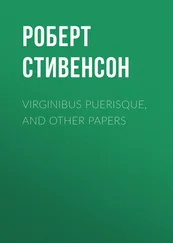Роберт Стивенсон - Lay Morals, and Other Papers
Здесь есть возможность читать онлайн «Роберт Стивенсон - Lay Morals, and Other Papers» — ознакомительный отрывок электронной книги совершенно бесплатно, а после прочтения отрывка купить полную версию. В некоторых случаях можно слушать аудио, скачать через торрент в формате fb2 и присутствует краткое содержание. Жанр: literature_19, foreign_antique, foreign_prose, essays, на английском языке. Описание произведения, (предисловие) а так же отзывы посетителей доступны на портале библиотеки ЛибКат.
- Название:Lay Morals, and Other Papers
- Автор:
- Жанр:
- Год:неизвестен
- ISBN:нет данных
- Рейтинг книги:3 / 5. Голосов: 1
-
Избранное:Добавить в избранное
- Отзывы:
-
Ваша оценка:
- 60
- 1
- 2
- 3
- 4
- 5
Lay Morals, and Other Papers: краткое содержание, описание и аннотация
Предлагаем к чтению аннотацию, описание, краткое содержание или предисловие (зависит от того, что написал сам автор книги «Lay Morals, and Other Papers»). Если вы не нашли необходимую информацию о книге — напишите в комментариях, мы постараемся отыскать её.
Lay Morals, and Other Papers — читать онлайн ознакомительный отрывок
Ниже представлен текст книги, разбитый по страницам. Система сохранения места последней прочитанной страницы, позволяет с удобством читать онлайн бесплатно книгу «Lay Morals, and Other Papers», без необходимости каждый раз заново искать на чём Вы остановились. Поставьте закладку, и сможете в любой момент перейти на страницу, на которой закончили чтение.
Интервал:
Закладка:
As we sat, dazed and overcome by emotion, he pointed out to us that the subject-matter was libellous in the highest degree, and the publication of the article might cause the loss of his entire substance. Without our concurrence he would not take such a risk. There was no dissenting voice; how could there be? The paper was published with almost no change or revision, though afterwards my husband said he considered this a mistake. He thought he should have waited for his anger to cool, when he might have been more impersonal and less egotistic.
The next day he consulted an eminent lawyer, more from curiosity than from any other reason. Mr. Moses – I think that was his name – was at first inclined to be jocular. I remember his smiling question: ‘Have you called him a hell-hound or an atheist? Otherwise there is no libel.’ But when he looked over the manuscript his countenance changed. ‘This is a serious affair,’ he said; ‘however, no one will publish it for you.’ In that Mr. Moses was right; no one dared publish the pamphlet. But that difficulty was soon overcome. My husband hired a printer by the day, and the work was rushed through. We then, my daughter, my son, and myself, were set to work helping address the pamphlets, which were scattered far and wide.
Father Damien was vindicated by a stranger, a man of another country and another religion from his own.
F. V. de G. S.LAY MORALS
The following chapters of a projected treatise on Ethics were drafted at Edinburgh in the spring of 1879. They are unrevised , and must not be taken as representing , either as to matter or form , their author’s final thoughts ; but they contain much that is essentially characteristic of his mind .
CHAPTER I
The problem of education is twofold: first to know, and then to utter. Every one who lives any semblance of an inner life thinks more nobly and profoundly than he speaks; and the best of teachers can impart only broken images of the truth which they perceive. Speech which goes from one to another between two natures, and, what is worse, between two experiences, is doubly relative. The speaker buries his meaning; it is for the hearer to dig it up again; and all speech, written or spoken, is in a dead language until it finds a willing and prepared hearer. Such, moreover, is the complexity of life, that when we condescend upon details in our advice, we may be sure we condescend on error; and the best of education is to throw out some magnanimous hints. No man was ever so poor that he could express all he has in him by words, looks, or actions; his true knowledge is eternally incommunicable, for it is a knowledge of himself; and his best wisdom comes to him by no process of the mind, but in a supreme self-dictation, which keeps varying from hour to hour in its dictates with the variation of events and circumstances.
A few men of picked nature, full of faith, courage, and contempt for others, try earnestly to set forth as much as they can grasp of this inner law; but the vast majority, when they come to advise the young, must be content to retail certain doctrines which have been already retailed to them in their own youth. Every generation has to educate another which it has brought upon the stage. People who readily accept the responsibility of parentship, having very different matters in their eye, are apt to feel rueful when that responsibility falls due. What are they to tell the child about life and conduct, subjects on which they have themselves so few and such confused opinions? Indeed, I do not know; the least said, perhaps, the soonest mended; and yet the child keeps asking, and the parent must find some words to say in his own defence. Where does he find them? and what are they when found?
As a matter of experience, and in nine hundred and ninety-nine cases out of a thousand, he will instil into his wide-eyed brat three bad things: the terror of public opinion, and, flowing from that as a fountain, the desire of wealth and applause. Besides these, or what might be deduced as corollaries from these, he will teach not much else of any effective value: some dim notions of divinity, perhaps, and book-keeping, and how to walk through a quadrille.
But, you may tell me, the young people are taught to be Christians. It may be want of penetration, but I have not yet been able to perceive it. As an honest man, whatever we teach, and be it good or evil, it is not the doctrine of Christ. What he taught (and in this he is like all other teachers worthy of the name) was not a code of rules, but a ruling spirit; not truths, but a spirit of truth; not views, but a view. What he showed us was an attitude of mind. Towards the many considerations on which conduct is built, each man stands in a certain relation. He takes life on a certain principle. He has a compass in his spirit which points in a certain direction. It is the attitude, the relation, the point of the compass, that is the whole body and gist of what he has to teach us; in this, the details are comprehended; out of this the specific precepts issue, and by this, and this only, can they be explained and applied. And thus, to learn aright from any teacher, we must first of all, like a historical artist, think ourselves into sympathy with his position and, in the technical phrase, create his character. A historian confronted with some ambiguous politician, or an actor charged with a part, have but one pre-occupation; they must search all round and upon every side, and grope for some central conception which is to explain and justify the most extreme details; until that is found, the politician is an enigma, or perhaps a quack, and the part a tissue of fustian sentiment and big words; but once that is found, all enters into a plan, a human nature appears, the politician or the stage-king is understood from point to point, from end to end. This is a degree of trouble which will be gladly taken by a very humble artist; but not even the terror of eternal fire can teach a business man to bend his imagination to such athletic efforts. Yet without this, all is vain; until we understand the whole, we shall understand none of the parts; and otherwise we have no more than broken images and scattered words; the meaning remains buried; and the language in which our prophet speaks to us is a dead language in our ears.
Take a few of Christ’s sayings and compare them with our current doctrines.
‘Ye cannot,’ he says, ‘ serve God and Mammon .’ Cannot? And our whole system is to teach us how we can!
‘ The children of this world are wiser in their generation than the children of light .’ Are they? I had been led to understand the reverse: that the Christian merchant, for example, prospered exceedingly in his affairs; that honesty was the best policy; that an author of repute had written a conclusive treatise ‘How to make the best of both worlds.’ Of both worlds indeed! Which am I to believe then – Christ or the author of repute?
‘ Take no thought for the morrow .’ Ask the Successful Merchant; interrogate your own heart; and you will have to admit that this is not only a silly but an immoral position. All we believe, all we hope, all we honour in ourselves or our contemporaries, stands condemned in this one sentence, or, if you take the other view, condemns the sentence as unwise and inhumane. We are not then of the ‘same mind that was in Christ.’ We disagree with Christ. Either Christ meant nothing, or else he or we must be in the wrong. Well says Thoreau, speaking of some texts from the New Testament, and finding a strange echo of another style which the reader may recognise: ‘Let but one of these sentences be rightly read from any pulpit in the land, and there would not be left one stone of that meeting-house upon another.’
Читать дальшеИнтервал:
Закладка:
Похожие книги на «Lay Morals, and Other Papers»
Представляем Вашему вниманию похожие книги на «Lay Morals, and Other Papers» списком для выбора. Мы отобрали схожую по названию и смыслу литературу в надежде предоставить читателям больше вариантов отыскать новые, интересные, ещё непрочитанные произведения.
Обсуждение, отзывы о книге «Lay Morals, and Other Papers» и просто собственные мнения читателей. Оставьте ваши комментарии, напишите, что Вы думаете о произведении, его смысле или главных героях. Укажите что конкретно понравилось, а что нет, и почему Вы так считаете.












